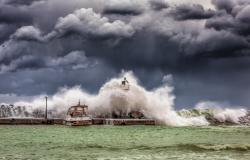The Caribbean: Catapulting through Climate Change yet Breaking the Fall

Isaac Solomon outlines the existential threat of climate change faced by the Caribbean and why wealthy nations at COP29 have a moral duty to step up to the plate and provide support.
As winter sets in across the northern hemisphere, a Caribbean holiday will likely be on many wish lists. However, beyond the turquoise waters, white sand beaches, and rich coral reefs, there’s a different story unfolding – one of rising sea levels, disappearing livelihoods, and entire communities at risk of permanent displacement and destruction.
It was only a few months ago that I stood in the midst of the devastation in the Grenadines Islands, as I visited sites immediately after the passage of Hurricane Beryl. Yet again, the Caribbean had been jolted by another force of nature, uprooting structures, displacing people and communities. We live under an existential threat accelerated by climate change but continue our efforts to prevent collapse.
The impact of climate change is often expressed in the future tense, but the future is now! In the Caribbean, the climate has already changed, with record-breaking temperature rises over the past 30 years inciting a vicious cycle of tropical cyclones, droughts, floods, and landslides. It is with some trepidation and yet a lot of hope that I have watched and experienced this threat.
Despite significant investment in the resilient water, energy, and transport infrastructure needed to adapt, many Caribbean nations require additional resources. Weak infrastructure is perpetually challenged by the frequency and intensity of events, which have the proclivity to reverse decades of development gains.
Governments and communities are forced to spend significant resources to repair and rebuild after storms flare, only for this to be undone when the next extreme weather event strikes. This vicious cycle has driven many of the region’s small island developing states (SIDS) to become the most heavily indebted countries in the world.
The impacts of climate change have battered the economic outlook of the entire region. Based on the Caribbean Development Bank’s most recent forecast update (May 2024), the region is projected to grow by just 1.7% this year, excluding Guyana. In the long-term, climate change could decimate key Caribbean industries, like tourism, which could halve by 2100.
These catapulting forces of climate change are accelerating, but there is a way to arrest this chaos and empower our region to become more resilient to climate shocks.
Prudent investments, including in coastal protections, water resource management, renewable energy, agricultural innovations, and early warning systems, are what is needed to help our economies adapt to new and unpredictable conditions.
The Caribbean Development Bank (CDB) has already made a concerted effort to scale-up flows of climate finance. Since 2017, CDB has approved approximately USD 347.4 million of investment, securing critical transport links, water and energy infrastructure across the region. The Bank is also committed to scaling-up lending and support for climate action in years to come, allocating 25-30 percent of its resources to meet this growing challenge.
While this investment has made an important difference, it is not enough. Developing nations such as those in the Caribbean urgently need additional financial support.
Other nations – that have historically contributed the most to greenhouse gas (GHG) emissions – bear responsibility for the increasing number of lives and livelihoods washed away every year. Caribbean nations contribute a miniscule fraction of GHG emissions (the entire region produces less than 1% of global emissions) yet they are amongst the most severely affected.
This is not just an environmental issue – it is a moral imperative. The Caribbean is paying the price for the industrial activities of wealthy nations.
Why would the international community not stand with the Caribbean in its fight for survival and the right of every nation to thrive in a safe and sustainable world? The international community has an obligation to support vulnerable countries, financially and technologically, as they continue to adapt and build resilience to an increasingly hostile climate.
And so – notwithstanding their obligations under international agreements – these countries must recognise this crisis as of their own doing and thereby step up to provide the support needed by others suffering at the sharp end of climate change.
As a crucial first step, COP29’s New Collective Quantified Goal (NCQG) on climate finance – set to replace the Paris Agreement target of mobilising $100 billion annually for developing countries – must be ambitious and prioritise accessibility and affordability.
With these priorities reinforced by adequate investments, strong leadership, and the inclusion of every citizen, we can build resilience, mitigate the risks, and break the fall.
The road ahead is undeniably steep, yet with global solidarity, innovative thinking, and unwavering commitment to climate justice, we can secure a future where the Caribbean not only endures but thrives. The call to action is clear: it's time to come together, break the cycle of disaster and recovery, and craft a legacy of hope and sustainability for generations to come. Are you ready to stand with us?
Isaac Solomon is the Acting President at the Caribbean Development Bank, the regional development finance institution based in Barbados committed to helping Borrowing Member Countries reduce inequality and halve the incidence of extreme poverty by the end of 2025, through supporting inclusive and sustainable growth and promoting good governance.
Photo by GEORGE DESIPRIS


